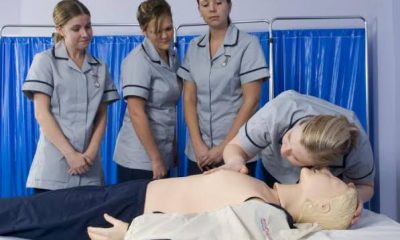Travels
What You Need to Consider Before Traveling to the United Kingdom
Planning a trip to the United Kingdom can be an exciting venture, filled with the promise of rich history, diverse cultures, and stunning landscapes. However, before you embark on your journey, it’s essential to consider several factors that can significantly impact your travel experience. From understanding visa requirements to navigating the transportation system, being well-informed will help you make the most of your visit. This guide will cover key aspects to keep in mind, ensuring you have a smooth and enjoyable trip to the UK, no matter your travel style or interests.
What You Need to Consider Before Traveling to the United Kingdom
Traveling to the United Kingdom can be an exciting and enriching experience. The UK is home to a rich history, diverse culture, and stunning landscapes. However, to ensure a smooth and enjoyable trip, there are several important factors to consider before you embark on your journey. This guide will help you prepare for your visit by outlining essential information, from visa requirements to cultural etiquette.
1. Visa Requirements
One of the first things to consider when planning your trip to the UK is whether you need a visa. Visa requirements vary depending on your nationality. Citizens of certain countries can enter the UK for short stays without a visa, while others may need to apply for one in advance.
It’s essential to check the official UK government website for the most up-to-date information on visa requirements based on your nationality and the purpose of your visit. If you do need a visa, ensure that you apply well in advance, as processing times can vary.
2. Currency and Payment Methods
The currency in the United Kingdom is the British Pound Sterling (GBP). Before traveling, familiarize yourself with the current exchange rates and consider exchanging some money before your trip for immediate expenses upon arrival.
Credit and debit cards are widely accepted throughout the UK, and ATMs are readily available. However, it’s a good idea to have some cash on hand for small purchases, especially in rural areas or at markets. Be aware of potential foreign transaction fees charged by your bank, and consider notifying your bank about your travel plans to avoid any issues with card usage abroad.
3. Weather and Best Time to Visit
The UK’s weather can be unpredictable, with rain possible at any time of year. The best time to visit generally depends on your preferences for weather and activities. The summer months (June to August) offer warmer temperatures and longer days, making them ideal for sightseeing and outdoor activities.
However, this is also the peak tourist season, so popular attractions may be crowded. Spring (March to May) and autumn (September to November) can be excellent times to visit, with milder weather, fewer crowds, and beautiful scenery. Winter (December to February) is cold and can be wet, but it also offers festive celebrations and unique experiences, especially around Christmas and New Year’s.
4. Transportation
The UK has a well-developed transportation system, including trains, buses, and the London Underground. If you plan to travel between cities, consider purchasing an intercity train ticket in advance for the best prices. The train network is extensive, providing convenient access to many destinations.
Within cities, public transportation is usually efficient. In London, for example, using an Oyster card or contactless payment can save you money on fares. Alternatively, consider renting a bicycle or walking to explore urban areas. If you plan to drive, be aware that traffic drives on the left side of the road, and familiarize yourself with local driving regulations.
5. Cultural Etiquette
Understanding cultural etiquette is vital for a smooth visit to the UK. British people tend to value politeness, so basic manners such as saying “please” and “thank you” go a long way. Queueing is also a significant aspect of British culture; always stand in line and wait your turn, whether at the bus stop, shops, or attractions.
When dining out, it’s customary to leave a tip of around 10-15% in restaurants, unless a service charge is included. Additionally, be mindful of personal space and avoid overly intrusive questions, especially when meeting someone for the first time.
6. Electrical Outlets and Connectivity
The UK uses a different electrical system than many other countries, with a standard voltage of 230V and a frequency of 50Hz. The plug type used in the UK is Type G, which has three rectangular prongs. If you plan to charge your devices, consider bringing a power adapter and voltage converter if necessary.
Internet connectivity is generally good in urban areas, with many cafés, restaurants, and public spaces offering free Wi-Fi. However, be prepared for limited connectivity in rural areas. It may be worthwhile to check with your mobile service provider regarding international roaming options or consider purchasing a local SIM card for better rates on data and calls.
7. Health and Safety
The UK is generally a safe destination for travelers, but it’s always wise to take standard precautions. Ensure that you have travel insurance that covers medical expenses, as healthcare services can be costly for non-residents.
Familiarize yourself with emergency numbers; in the UK, the emergency number for police, fire, and ambulance services is 999. Additionally, make sure to stay updated on any health advisories or requirements, especially if you’re traveling during a pandemic.
8. Local Attractions and Activities
Before your trip, research local attractions and activities to maximize your experience. The UK is rich in history and culture, with numerous museums, historical sites, and natural wonders to explore. Popular attractions include the Tower of London, Buckingham Palace, Stonehenge, and the Scottish Highlands.
Consider purchasing a city pass or attraction tickets in advance to save money and skip long lines at popular sites. If you have specific interests, such as art, music, or sports, look for events or exhibitions happening during your visit to enhance your experience.
9. Language and Communication
English is the primary language spoken in the UK, but you may encounter regional dialects and accents that can vary significantly. While most people will understand standard English, it’s helpful to familiarize yourself with a few local phrases and expressions.
In tourist areas, staff are usually accustomed to interacting with international visitors and will be able to assist you. However, if you’re traveling to more rural areas, learning a few basic phrases can enhance your interactions with locals and show your appreciation for their culture.
10. Packing Essentials
Finally, consider what to pack for your trip. The UK’s weather can be changeable, so layering is key. Bring a mix of clothing suitable for various conditions, including waterproof jackets and comfortable shoes for walking. If you plan to visit religious sites, be mindful of dress codes and pack appropriate clothing.
Additionally, consider packing any necessary medications, travel-sized toiletries, and a reusable water bottle to stay hydrated while exploring. Having these essentials will help ensure a comfortable and enjoyable trip.
Conclusion
Traveling to the United Kingdom is an exciting opportunity to explore a country rich in history, culture, and natural beauty. By considering these essential factors before your trip, you can ensure a smoother, more enjoyable experience. From visa requirements and currency to local customs and attractions, being well-prepared will allow you to make the most of your time in this diverse and captivating destination. So, get ready to pack your bags and embark on an unforgettable journey in the UK!



















